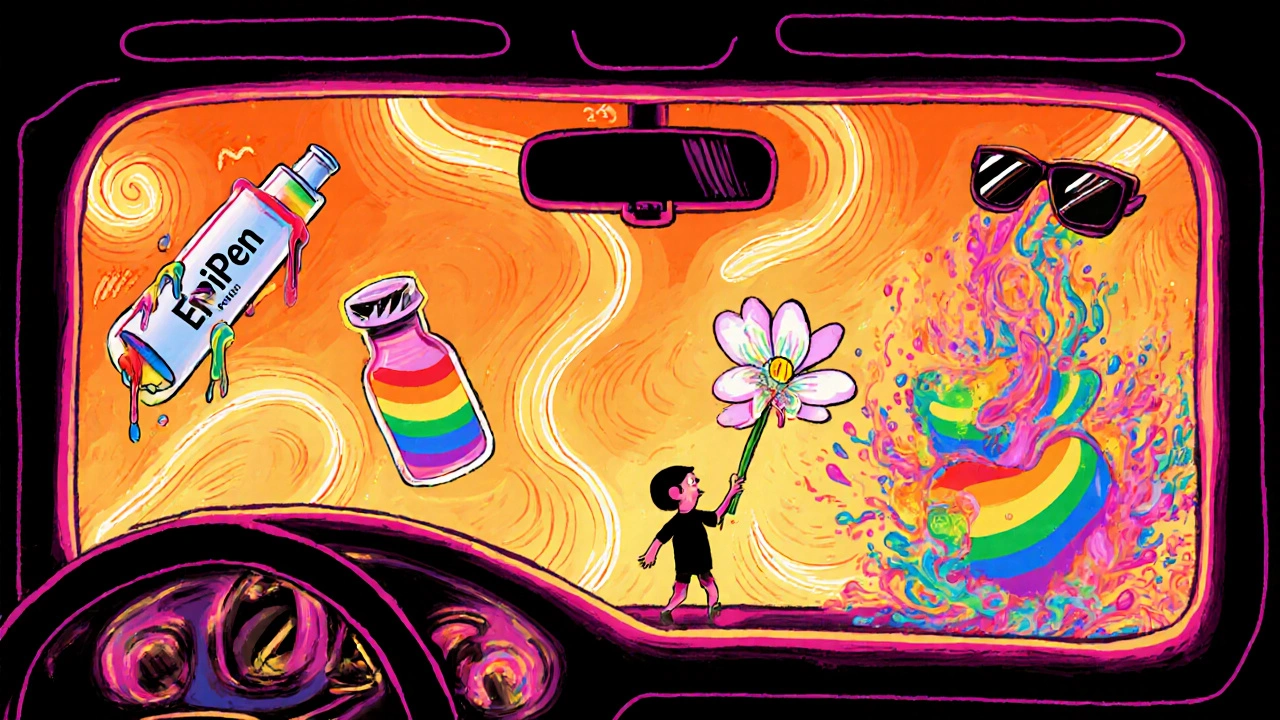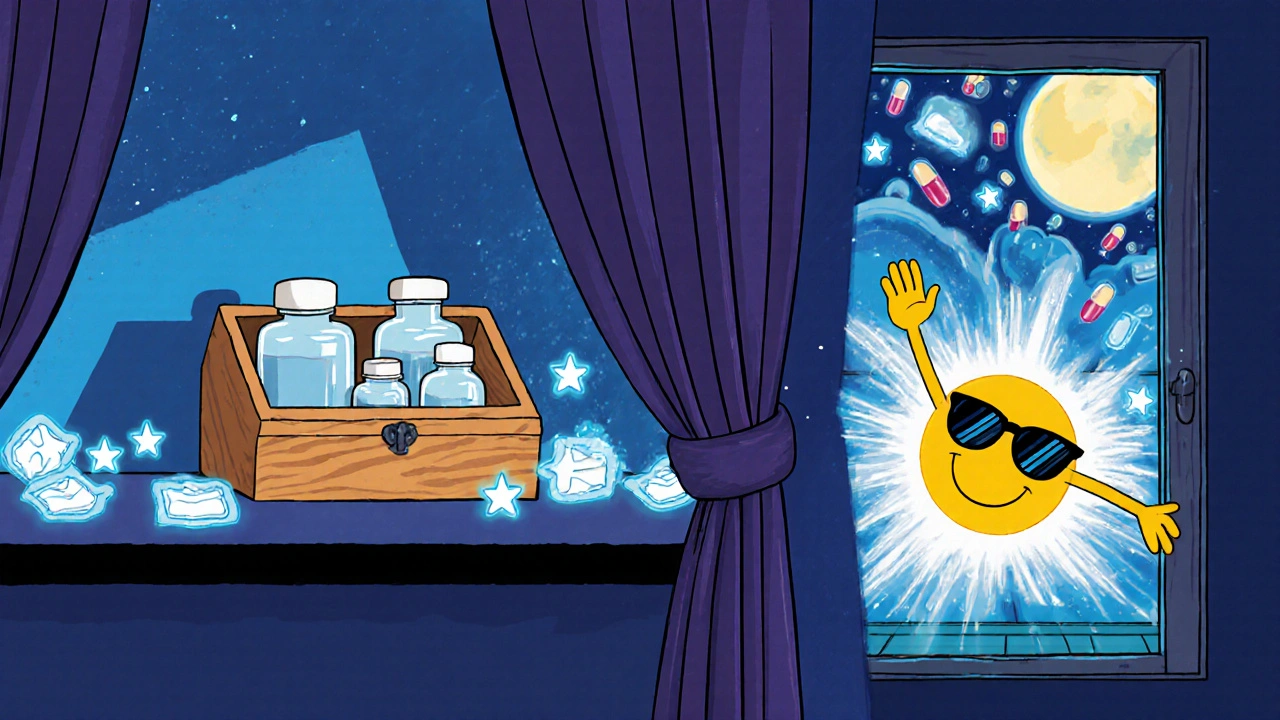How Humidity and Heat Speed Up Medication Expiration

When you grab a bottle of pills from your medicine cabinet, you assume they’ll work exactly as intended. But what if they’ve already lost their power-before the expiration date even passed? The truth is, heat and humidity can wreck your meds faster than you think. You don’t need to wait until the label says "expired" for your medicine to become weak, dangerous, or useless. In places like Perth, where summer temps regularly hit 35°C (95°F) and humidity climbs after rain, storing medications the wrong way isn’t just careless-it’s risky.
Why Your Medicine Doesn’t Last as Long as the Label Says
Expiration dates aren’t arbitrary. They’re based on strict testing done in labs that mimic ideal conditions: cool, dry, and dark. The U.S. Pharmacopeia sets the standard at 20-25°C (68-77°F) with 35-65% humidity. That’s not your bathroom. That’s not your kitchen counter. That’s not your car on a hot day. When you store medicine in places that get hotter or damper than that, chemical reactions start breaking down the active ingredients. It’s not magic. It’s chemistry. Moisture causes tablets to swell, stick together, or dissolve unevenly. Heat makes liquids evaporate or proteins unravel. Even a few days in a hot car can do irreversible damage.Which Medications Are Most at Risk?
Not all meds are created equal. Some can handle a little heat. Others fall apart at the first sign of warmth. High-risk medications:- Insulin: Loses up to 20% of its potency after just 24 hours at 37°C (98.6°F). For diabetics, that means blood sugar spikes-or worse.
- Nitroglycerin: Used for chest pain. Degrades rapidly above 25°C. A degraded dose could mean the difference between life and death during a heart attack.
- Thyroid meds: Must stay below 27°C (80.6°F). Heat reduces absorption, leaving you with untreated hypothyroidism.
- Antibiotic suspensions (like amoxicillin): Lose 30-40% potency within 72 hours at room temperature. That’s not just ineffective-it can lead to antibiotic resistance.
- Biologics (monoclonal antibodies): These are proteins. Heat above 8°C (46.4°F) causes them to unfold permanently. No recovery. No second chances.
- EpiPens: The injector mechanism can fail at temperatures above 30°C (86°F). In anaphylaxis, that’s catastrophic.
- Inhalers: The propellant inside expands under heat. Above 49°C (120°F), they can explode.
- Acetaminophen (Tylenol)
- Ibuprofen (Advil)
- Most statins (like atorvastatin)
Where You’re Probably Storing Your Meds (And Why It’s a Problem)
The most common storage spots are also the worst. The bathroom cabinet: Steam from showers pushes humidity to 70-90%. That’s worse than a rainforest. Moisture seeps into blister packs and bottles. Tablets soften. Capsules crack. Aspirin turns into vinegar and salicylic acid-irritating your stomach and losing its painkilling power. The kitchen: Near the stove, sink, or dishwasher? Temperatures regularly climb above 32°C (90°F). Humidity spikes when you boil water or run the dishwasher. Your blood pressure pills aren’t meant to be baked. The car: On a 38°C day, your car’s interior can hit 60°C (140°F) in under an hour. That’s hotter than an oven. Insulin, EpiPens, or heart meds left in the glovebox are essentially trash by the time you get home. Windowsills or near heaters: Sunlight doesn’t just fade labels-it breaks down chemicals. UV rays speed up degradation. Even clear bottles aren’t safe.
How to Tell If Your Medicine Is Damaged
You can’t always tell by looking. But here are warning signs:- Tablets that are discolored, cracked, or sticky
- Capsules that are soft, swollen, or leaking
- Liquids that are cloudy, thick, or have particles floating in them
- Unusual smells-like vinegar from aspirin or sourness from insulin
- Change in texture: a pill that crumbles easily or won’t dissolve like it used to
How to Store Medications the Right Way
Follow these simple rules to keep your meds working:- Keep them cool: Aim for 15-25°C (59-77°F). A bedroom drawer, a closet shelf, or a cabinet away from windows works best.
- Keep them dry: Use a sealed container with a silica gel packet (the little "do not eat" packs you find in new shoes or electronics).
- Keep them dark: Store in original opaque bottles. If the bottle is clear, put it in a box.
- Keep them sealed: Always close caps tightly. Moisture gets in fast if the lid is loose.
- Don’t transfer pills: Don’t dump them into pill organizers unless you’re using them that day. Organizers expose meds to air and moisture.
- Refrigerate only if needed: Some meds like insulin or liquid antibiotics require fridge storage. But never freeze them. Condensation forms when you take them out, and that’s bad.

Why This Isn’t Just About Potency-It’s About Safety
Losing potency sounds like a minor issue. But the consequences aren’t. If your antibiotic doesn’t kill all the bacteria, the survivors become stronger. That’s how antibiotic resistance starts. If your insulin doesn’t lower your blood sugar, you risk nerve damage, kidney failure, or diabetic coma. If your EpiPen fails during an allergic reaction, you could die. The FDA says using expired or improperly stored medicine is "risky and possibly harmful." That’s not a warning label. That’s a medical fact.What’s Being Done-and What You Can Expect
Pharmacies are starting to use smarter packaging: desiccants inside bottles, temperature-sensitive labels that change color if exposed to heat, and opaque containers that block UV light. Some hospitals now track storage conditions for insulin and other critical drugs. In the future, smart pill bottles with Bluetooth sensors might alert you if your meds got too hot. But for now, the responsibility is yours. Climate change is making this worse. Heat waves are longer. Humidity is rising. The World Health Organization has flagged medication stability in extreme climates as a growing public health threat. If you live in a place like Perth, where summer temperatures regularly break 40°C, this isn’t theoretical-it’s daily reality.What to Do If You’re Not Sure
If you’re unsure whether your medicine is still good:- Call your pharmacist. They’ve seen hundreds of damaged bottles.
- Check the manufacturer’s website. Many list storage guidelines.
- When in doubt, throw it out. Replacing a $20 pill is cheaper than a hospital visit.
robert cardy solano
November 21, 2025 AT 03:38Been storing my ibuprofen in the bathroom for years. Just learned I’ve been slowly poisoning myself with vinegar pills. Thanks for the wake-up call.
swatantra kumar
November 22, 2025 AT 06:09Man, in India we just keep everything in the kitchen since AC is a luxury. My aunt’s insulin got warm during Diwali last year-she ended up in the ER. This isn’t just a Western problem. Climate change doesn’t care about borders.
Brianna Groleau
November 22, 2025 AT 14:11I never thought about how my thyroid meds might be turning into paperweights in my drawer next to the window. I mean, I’ve got a whole shelf of bottles just sitting there like they’re on vacation. I’m moving them to the back of my closet tonight-no more sunbathing pills. Also, I just bought silica gel packets from Amazon. I feel like a scientist now.
Nick Naylor
November 23, 2025 AT 07:53Sarah Swiatek
November 24, 2025 AT 03:33Oh wow, so the reason my EpiPen didn’t work last summer wasn’t because I panicked-it was because I left it in the glovebox during that 105°F road trip? That’s not a coincidence, that’s a death sentence waiting to happen. I’m buying a thermal pouch today. And yes, I’m telling everyone I know. This is the kind of info that saves lives, not just pills.
serge jane
November 24, 2025 AT 12:41It’s funny how we treat our bodies like temples but our medicine like it’s just another thing to toss on the counter. We meditate, we juice, we track our steps-but we let our insulin bake in the sun like it’s a soda can at a tailgate. There’s a philosophical disconnect here. We want longevity but refuse to honor the tools that make it possible. The expiration date isn’t a deadline-it’s a promise. And we’re breaking it every day without realizing it.
Pawan Jamwal
November 24, 2025 AT 16:08India has been dealing with heat for centuries. We store everything in clay pots, keep things in shaded corners, and never trust plastic packaging. Why are Americans only now learning this? You have AC, you have refrigerators, you have pharmacies with climate control. If your medicine is going bad, it’s because you’re lazy, not because the world is ending.
Dave Wooldridge
November 26, 2025 AT 05:27Did you know the government already knows this? They’ve been quietly replacing all insulin with synthetic versions that don’t degrade as fast. But they won’t tell you because they want you to keep buying new ones. That’s why they don’t put warning labels on the bottles. It’s not about safety-it’s about profit. And they’re letting old people die so Big Pharma can keep cashing in.
Rebecca Cosenza
November 26, 2025 AT 14:58Throw it out. 💀
Rusty Thomas
November 28, 2025 AT 11:04Okay but imagine if your EpiPen just… didn’t work. Like, you’re having an allergic reaction, you’re gasping, you’re fumbling with it, and then-click-nothing. No spray. No relief. Just silence. And then your face swells up and you’re on the floor and your kids are screaming and the ambulance is coming but it’s too late. That’s not a hypothetical. That’s someone’s mom. That’s someone’s dad. That’s someone’s sibling. And it’s all because they kept their meds in the damn bathroom. I’m not even mad. I’m just… heartbroken.